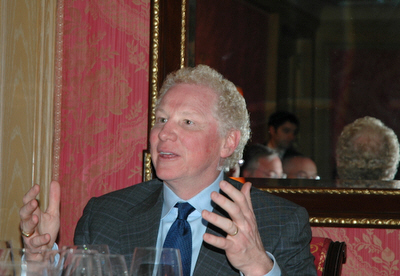Ingres prepares for assault on Oracle's turf

Ingres Chairman and CEO Terry Garnett looks at the estimated $18 billion spent on databases annually and sees a market ripe for disruption. In fact, he thinks Ingres can carve out 5- to 10-percent of that market, including a good chunk for Oracle's multibillion dollar enterprise database business. During the five-course dinner with journalists he hosted along with other Ingres executives last night at the tony Ritz Carleton in San Francisco, Garnett identified Oracle as "enemy number one."

How does Garnett plan to go after Oracle and create the big payday? He proclaimed that he has hired the best athletes and talent. "We will break a lot of rules and take risks because of our size and who we are," Garnett said.
Garnett's investment firm, Garnett & Helfrich Capital, hooked up with Ingres owner Computer Associates to open source the database software and form a new private company. Over the last several months, Garnett has been arming the company to compete against Oracle, IBM and Microsoft by hiring former Oracle, Veritas, IBM and Microsoft executives to run the company. This is not your lean and mean open source startup.
The most recent hire, chief architect Bill Maimone, is a 20 year Oracle veteran, most recently a vice president in Oracle’s Server Technologies division. I asked Maimone what motivated him to leave Oracle. "Oracle lost some of its focus--it looks like CA [when CA was acquiring dozens of company in the 1990's]," Maimone said. In his due diligence, he found Ingres to be a "pretty good product." The Ingres kernal group is about 30 people, he said, which was the same number as when he started at Oracle in 1986. "It's a different dynamic when you have 1000 people and six products and more meetings," he added.
Men of Ingres
From top left first row: Terry Garnett (Oracle); Tom Berquist (Citigroup, Goldman Sachs); Michael Coney (Veritas, Sun); Bill Maimone (Oracle). Second row: Jim Finn (Oracle, IBM); Dave Darko (Oracle); Anthony De Cicco (Veritas, Informix); Dev Mukherjee (Microsoft, IBM).
The Ingres team may have about 1000 man-years of Oracle experience, according to Garnett, but the 10,000 Ingres customers account for less that 1 percent share of the revenue pie. MySQL is also a well-capitalized open source database, but Ingres is more head to head with Oracle and IBM in the enterprise.
Garnett talks about having more palatable business practices than Oracle as a way to entice customers, but his first incursion into Oracle's territory is to make friends with Red Hat and BEA, which are predominantly shipped with Oracle. Given Larry Ellison's array of applications servers that compete with BEA and Red Hat's reliance on Oracle, Ingres sees an opportunity to step in as a pure database play. With Ingres 2006, the company is building a separate stack "mute Oracle's hold" with those two major partners, Garnett said. Ingres also wants to take advantage of the disruption as Oracle shifts from its licensing model to subscription-based support services over the next few years. Garnett claims that Ingres' support contracts are one-third to one-half of what Oracle charges today. He also boasts of "knowing where all the bodies are buried customer by customer" as it relates to Oracle. For example, he said that one-third of all Oracle customers are still on Oracle 7, which came out in 1992 when Garnett worked at the company.
Ingres is also building a plug and play software appliance--a monolithic maintenance unit, according to CTO Dave Darko, and Maimone said his focus would be on integrating compliance into the database itself, which is what he said he would have been doing at Oracle if he hadn't left.
In essense, Ingres wants to become the Red Hat of databases--an open source, subscription based solution that leverages its community (in this case companies like Bearing Point, Infosys and players who are now in the Oracle ecosystem who inform the direction of the code, not the open source community writ large) that dominates its market. Ellison is going to continue to buy up closed and open source companies to defend his perimeter and grow the customer list, but a precision strike by the well endowed Ingres team and undermining Oracle with Red Hat and BEA could force a kind of showdown. Just as Microsoft is scrambling to respond to Google's scale and momentum in the Web 2.0 arena, Oracle will have move faster to blunt the assault by many of its former employees...
Update: Tom Foremski also covers the Ingres dinner conversation...